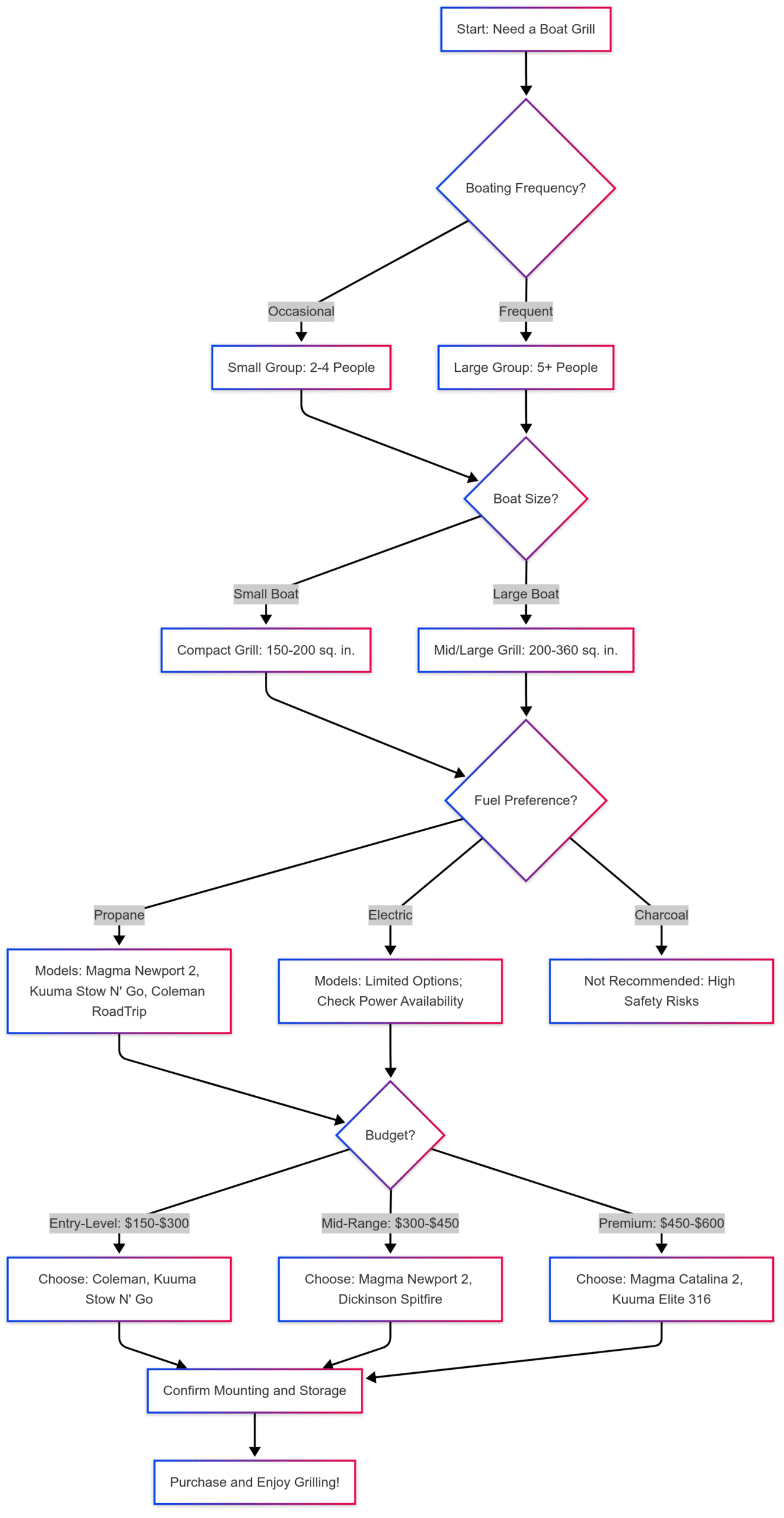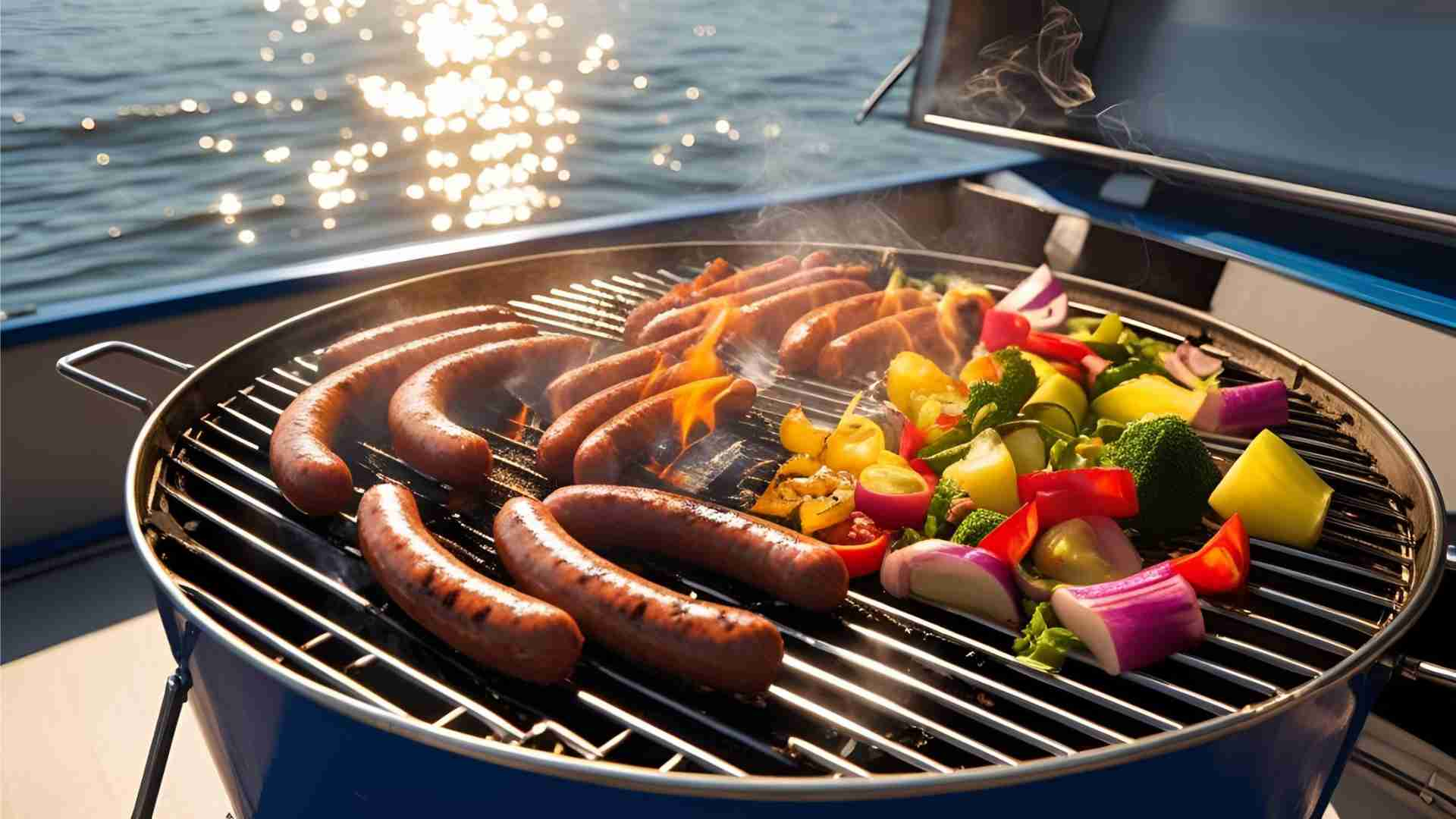Discover the best boat barbecue grills for safe, convenient, and delicious cooking on the water. Explore top brands, features, and tips.
Boating offers a unique blend of adventure, relaxation, and scenic beauty. Adding a barbecue grill to your vessel elevates this experience, allowing you to savor freshly grilled meals while surrounded by water. Boat barbecue grills are engineered for marine environments, combining convenience, safety, and performance to make on-water dining unforgettable. This comprehensive guide explores the benefits, features, and top brands of boat grills, helping you choose the perfect model for your boating lifestyle.
Why Choose a Boat Barbecue Grill?
Boat grills transform your vessel into a floating kitchen, offering practical and social advantages. Here’s why they’re a must-have for boaters:
1. Enhanced Boating Experience
Grilling on the water creates memorable moments. Whether you’re anchored at a private dock or cruising a serene lake, the aroma of sizzling steaks or fresh seafood enhances the ambiance. Grilling fosters a social atmosphere, inviting friends and family to gather, cook, and share stories, making every outing a celebration.
2. Healthier Cooking
Grilling is a healthier alternative to frying. Excess fat drips away from food, resulting in leaner meals. Open-flame cooking seals in moisture and nutrients, preserving the flavor and nutritional value of meats, vegetables, and seafood. This makes boat grills ideal for health-conscious boaters.
3. Convenience and Efficiency
Boat grills are designed for ease of use. Compact and lightweight, they fit seamlessly into a boat’s layout. Features like adjustable heat controls and even heat distribution ensure precise cooking, while quick setup and cleanup save time for enjoying the water.
4. Safety in Marine Environments
Safety is paramount on a moving vessel. Boat grills feature secure mounting systems, hinged lids, and grease trays to prevent accidents. Marine-grade stainless steel construction resists rust and corrosion, ensuring durability in harsh saltwater conditions.
5. Cost-Effectiveness
Boat grills are available at various price points, with propane models offering fuel efficiency. Investing in a durable grill reduces long-term costs by minimizing replacements and maintenance.
Boat Grills vs. Regular Portable Grills
Boat grills and regular portable grills serve distinct purposes. Below is a comparison to highlight their differences:
| Aspect | Boat Grills | Regular Portable Grills |
|---|---|---|
| Design | Compact, marine-grade steel with hinged lids and mounting brackets. | Built for land use with cast iron, steel, or ceramic; often bulkier. |
| Materials | Marine-grade stainless steel for rust and corrosion resistance. | Standard stainless steel or powder-coated steel; less resistant to saltwater. |
| Security | Rail mounts, rod holder mounts, and locking lids for stability on water. | Relies on stable ground; may have wheels but lacks marine-specific mounts. |
| Safety Features | Grease trays, flame control, and wind-resistant designs. | Flame tamers and grease trays; less focus on motion-related safety. |
| Convenience | Lightweight, foldable legs, and quick setup for boat use. | Larger, with wheels and side shelves; less suited for compact boat spaces. |
| Storage | Compact designs fit small boat compartments. | Requires more storage space; less optimized for confined areas. |
| Performance | Infrared burners and wind-resistant systems for consistent heat. | Charcoal offers smoky flavor; gas provides precise control but not marine-optimized. |
Boat grills excel in marine environments due to their specialized design, while regular grills are better suited for land-based activities like camping or tailgating.
Types of Boat Grills
Boat grills come in three main types, each with unique advantages and considerations:
1. Gas Grills
- Fuel: Propane or natural gas.
- Pros: Quick startup, precise temperature control, minimal cleanup. Propane tanks are compact and widely available.
- Cons: Requires secure storage of propane tanks to prevent leaks.
- Best For: Boaters seeking convenience and consistent heat.
2. Charcoal Grills
- Fuel: Charcoal briquettes.
- Pros: Imparts a smoky flavor; simple setup on land.
- Cons: Challenging to manage on boats due to hot coals, ash disposal, and wind sensitivity. Poses higher fire risks.
- Best For: Traditionalists willing to prioritize safety measures.
3. Electric Grills
- Fuel: Electricity (requires a generator or shore power).
- Pros: No open flames, easy to use, ideal for flame-restricted areas.
- Cons: Limited by power availability; less practical for boats without generators.
- Best For: Boaters with reliable onboard power sources.
Gas grills are the most popular for boating due to their balance of convenience, safety, and performance.
Key Features of Boat Barbecue Grills
Boat grills are packed with features tailored for marine use. Here’s what to look for:
- Marine-Grade Stainless Steel: Resists rust and corrosion from saltwater exposure.
- Secure Mounting Systems: Rail mounts, rod holder mounts, or deck mounts prevent tipping.
- Hinged Lids: Lock in place to stay secure in rough waters.
- Grease Trays: Collect drippings to reduce flare-ups and simplify cleaning.
- Wind Guards: Maintain consistent heat in breezy conditions.
- Infrared Burners: Provide even heat distribution for precise cooking.
- Push-Button Ignition: Ensures safe and controlled lighting.
- Compact Design: Fits small boat spaces and simplifies storage.
- Protective Covers: Extend grill lifespan by shielding from elements.
Top Boat Barbecue Grill Brands
Several brands dominate the marine grill market, offering models for various boat sizes and budgets. Below are the leading options, including specifications and approximate prices (based on typical retail ranges):
1. Magma Products
- Overview: A pioneer in marine grills, Magma is known for durability and versatility.
- Key Models:
- Magma Catalina 2 Gourmet Series:
- Cooking Area: 360 sq. in.
- Material: Marine-grade stainless steel.
- Features: Infrared burners, foldable legs, rail or rod holder mounts.
- Fuel: Propane.
- Price: ~$500–$600.
- Magma Newport 2 Classic:
- Cooking Area: 162 sq. in.
- Material: Stainless steel.
- Features: Compact design, wind guards, grease tray.
- Fuel: Propane.
- Price: ~$350–$450.
- Pros: Wide range of mounting options, excellent heat distribution.
- Cons: Higher-end models can be pricey.
2. Kuuma
- Overview: Kuuma focuses on user-friendly grills with robust construction.
- Key Models:
- Kuuma Stow N’ Go 216:
- Cooking Area: 216 sq. in.
- Material: Marine-grade stainless steel.
- Features: Removable grease tray, foldable legs, precise heat control.
- Fuel: Propane.
- Price: ~$250–$350.
- Kuuma Elite 316:
- Cooking Area: 316 sq. in.
- Material: Stainless steel.
- Features: Dual burners, locking lid, rail mounts.
- Fuel: Propane.
- Price: ~$400–$500.
- Pros: Easy cleanup, affordable options.
- Cons: Fewer advanced features compared to Magma.
3. Dickinson Marine
- Overview: Known for innovative designs and premium performance.
- Key Models:
- Dickinson Spitfire 180:
- Cooking Area: 180 sq. in.
- Material: Marine-grade stainless steel.
- Features: Infrared burners, push-button ignition, wind-resistant design.
- Fuel: Propane.
- Price: ~$300–$400.
- Dickinson Sea-B-Que:
- Cooking Area: 240 sq. in.
- Material: Stainless steel.
- Features: Locking lid, grease tray, rod holder mount.
- Fuel: Propane.
- Price: ~$450–$550.
- Pros: Advanced burner technology, excellent customer support.
- Cons: Limited model variety.
4. Coleman
- Overview: A camping brand with portable grills suitable for boating.
- Key Models:
- Coleman RoadTrip 225 Marine:
- Cooking Area: 225 sq. in.
- Material: Stainless steel.
- Features: Collapsible legs, removable grates, propane canister compatible.
- Fuel: Propane.
- Price: ~$150–$250.
- Pros: Budget-friendly, highly portable.
- Cons: Less durable in harsh marine conditions.
Comparison Table: Top Boat Grill Models
| Brand/Model | Cooking Area (sq. in.) | Fuel | Key Features | Price Range |
|---|---|---|---|---|
| Magma Catalina 2 | 360 | Propane | Infrared burners, rail mounts | $500–$600 |
| Magma Newport 2 Classic | 162 | Propane | Compact, wind guards | $350–$450 |
| Kuuma Stow N’ Go 216 | 216 | Propane | Removable grease tray, foldable legs | $250–$350 |
| Kuuma Elite 316 | 316 | Propane | Dual burners, locking lid | $400–$500 |
| Dickinson Spitfire 180 | 180 | Propane | Infrared burners, push-button ignition | $300–$400 |
| Dickinson Sea-B-Que | 240 | Propane | Locking lid, rod holder mount | $450–$550 |
| Coleman RoadTrip 225 Marine | 225 | Propane | Collapsible legs, removable grates | $150–$250 |
Choosing the Right Boat Grill
Selecting the ideal boat grill depends on your boating habits, budget, and preferences. Consider these factors:
1. Boating and Grilling Frequency
- Casual Boaters: For occasional trips with small groups (2–4 people), a compact grill like the Magma Newport 2 or Coleman RoadTrip 225 is sufficient.
- Frequent Boaters: For regular outings or larger gatherings, opt for a larger model like the Magma Catalina 2 or Kuuma Elite 316 with multiple burners.
2. Boat Size and Storage
- Measure your boat’s deck or storage compartments to ensure the grill fits. Compact models with foldable legs or removable parts are ideal for smaller vessels.
- Mounting options (rail, rod holder, or deck) should align with your boat’s design.
3. Fuel Preference
- Propane: Most versatile and widely available; ensure secure tank storage.
- Electric: Suitable for boats with generators; limited by power access.
- Charcoal: Riskier on boats; best avoided unless you’re highly experienced.
4. Budget
- Entry-Level ($150–$300): Coleman RoadTrip 225, Kuuma Stow N’ Go 216.
- Mid-Range ($300–$450): Magma Newport 2, Dickinson Spitfire 180.
- Premium ($450–$600): Magma Catalina 2, Kuuma Elite 316, Dickinson Sea-B-Que.
5. Additional Features
- Prioritize safety features like grease trays, locking lids, and wind guards.
- Look for easy-clean designs to simplify maintenance after grilling.
Safety Tips for Boat Grilling
Grilling on a boat requires extra caution due to motion, limited space, and proximity to water. Follow these safety guidelines:
- Use Marine-Specific Grills: Only use grills designed for boats to ensure stability and safety.
- Secure the Grill: Mount the grill firmly using rail, rod holder, or deck mounts. Use a non-slip pad for deck grills to protect surfaces.
- Avoid Indoor Grilling: Never grill in enclosed spaces like cabins to prevent carbon monoxide buildup.
- Manage Fuel Safely:
- Store propane tanks in well-ventilated areas away from heat sources.
- Check for leaks before igniting.
- Control Flare-Ups: Use grease trays to catch drippings and reduce fire risks.
- Keep a Fire Extinguisher Nearby: Be prepared for emergencies.
- Monitor Wind Direction: Position the grill to avoid flames spreading toward flammable materials.
Tips for Grilling on the Water
Maximize your boat grilling experience with these practical tips:
- Prep in Advance: Marinate meats and chop vegetables before boarding to save space and time.
- Use Compact Tools: Bring lightweight utensils and a small cutting board to conserve space.
- Cook in Batches: For larger groups, grill in stages to ensure even cooking.
- Clean Immediately: Rinse grates and grease trays after cooling to prevent corrosion.
- Protect the Grill: Use a cover when not in use to shield from saltwater and weather.
Chart: Boat Grill Selection Process
Below is a flowchart to guide your boat grill selection:

Conclusion
A boat barbecue grill is more than a cooking tool—it’s a gateway to unforgettable on-water dining experiences. With brands like Magma, Kuuma, Dickinson Marine, and Coleman offering durable, safe, and efficient grills, there’s a model for every boater’s needs and budget. By prioritizing marine-grade materials, secure mounting, and safety features, you can enjoy delicious meals while navigating lakes, seas, or private docks. Whether you’re grilling steaks, seafood, or vegetables, a boat grill ensures your culinary adventures are as thrilling as your boating ones. Choose wisely, follow safety protocols, and fire up your grill for the ultimate aquatic feast.
Happy Boating!
Share Boat Barbecue Grills for Convenient Cooking on the Water with your friends and leave a comment below with your thoughts.
Read How to Test a Boat Fuel Gauge: Simple Steps and Tips until we meet in the next article.
